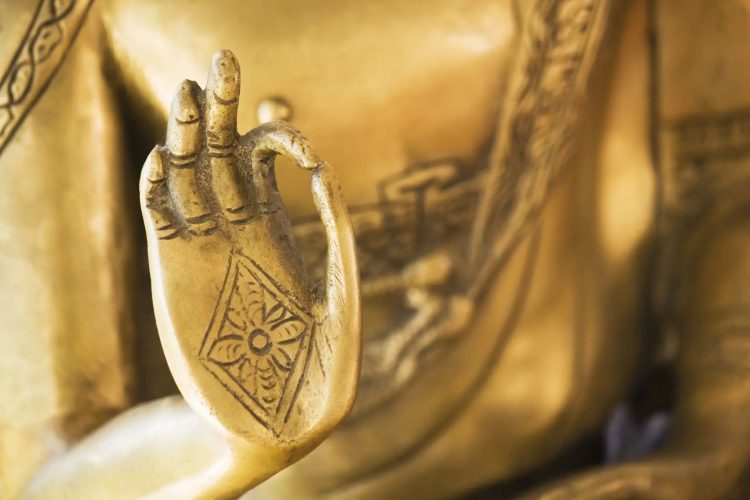“Karma… What goes around comes around.” You’ve heard it before, perhaps you have even said it. Very often, we’ll say this phrase when something bad happens to someone. As if karma is a form of justice that balances the scales of wrongdoing. Karma is often misunderstood as some sort of cosmic disciplinarian. If we act well, good things will come back to us as a reward. If we act poorly, bad things will come back to us as punishment. In actuality, the word karma translates to mean “action” or “cause and effect.” The word itself has no negative connotation – though, in our skewed cultural understanding, we have assigned it one.
In the Buddhist understanding of the word, every action born out of an intention creates a ripple that outwardly expands, ultimately impacting our lives and the lives of those around us. And, while the word karma means action, it’s not relegated only to the deeds we perform. Our thoughts and speech also count. What we think and the words that we choose to use carry intention, and, they too contribute to the ripple of karma. This can be a tough pill to swallow. Our thoughts are internal and unseen, so how can they possibly contribute to karma?
If I consistently harbor feelings of anger and animosity toward the world around me, I condition my mind toward these feelings. And because of this conditioning, these negative and confusing feelings become the status quo of my mind. Anger and animosity become the lens through which I view the world, and influence the deeds that I perform. My words will reflect this conditioning of my mind. I may use harsh or slanderous speech. My actions will reflect this conditioning. I may act unkindly towards people.
The converse is also true. If I work to cultivate feelings of kindness and generosity, my mind becomes conditioned to see the world through this lens. The words that I choose and the actions I perform will be a reflection of this mindset.
The Buddha spoke of the karma of thinking in the Dvedhavitakka Sutta. In this sutra, he said:
[quote author=”Buddha”]“Whatever a monk keeps pursuing with his thinking and pondering, that becomes the inclination of his awareness. If a monk keeps pursuing thinking imbued with sensuality, abandoning thinking imbued with renunciation, his mind is bent by that thinking imbued with sensuality. If a monk keeps pursuing thinking imbued with ill will, abandoning thinking imbued with non-ill will, his mind is bent by that thinking imbued with ill will. If a monk keeps pursuing thinking imbued with harmfulness, abandoning thinking imbued with harmlessness, his mind is bent by that thinking imbued with harmfulness.”[/quote]
For me, changing the inner dialogue came through the practice of metta, or loving-kindness, meditation. Metta practice is from the Buddhist tradition. This form of meditation is designed to cultivate feelings of kindness, friendliness, and benevolence. In metta meditation, through the use of specific phrases, you first direct loving-kindness toward yourself, then, in a
sequence of expansion, toward somebody you love, somebody you are neutral toward, somebody you have difficulty with, and finally toward all beings everywhere.
While metta meditation phrasing varies, these are the phrases that I use:
- May I be free from suffering and the causes of suffering.
- May I feel safe in the world.
- May I be healthy in body, mind, and heart.
- May I be happy.
In the Karaniya Metta Sutta, the Buddha spoke about the impact of the metta practice:
“This is what should be done
By one who is skilled in goodness,
And who knows the path of peace:
Let them be able and upright,
Straightforward and gentle in speech,
Humble and not conceited,
Contented and easily satisfied,
Unburdened with duties and frugal in their ways.Peaceful and calm and wise and skillful,
Not proud or demanding in nature.
Let them not do the slightest thing
That the wise would later reprove.
Wishing: In gladness and in safety,
May all beings be at ease.
Whatever living beings there may be;
Whether they are weak or strong, omitting none,
The great or the mighty, medium, short or small,
The seen and the unseen,
Those living near and far away,
Those born and to-be-born —
May all beings be at ease!Let none deceive another,
Or despise any being in any state.
Let none through anger or ill-will
Wish harm upon another.Even as a mother protects with her life
Her child, her only child,
So with a boundless heart
Should one cherish all living beings;
Radiating kindness over the entire world:
Spreading upwards to the skies,
And downwards to the depths;
Outwards and unbounded,
Freed from hatred and ill-will.Whether standing or walking, seated or lying down
Buddha
Free from drowsiness,
One should sustain this recollection.
This is said to be the sublime abiding.
By not holding to fixed views,
The pure-hearted one, having clarity of vision,
Being freed from all sense desires,
Is not born again into this world.”
If you find yourself struggling with unhelpful thoughts, or going through a difficult time in life, I encourage you to try this meditation. You will be surprised how a commitment to this particular practice will soften you; transforming your internal dialogue and how you relate to the external world.















One reply on “Understanding the True Meaning of Karma”
Great article! Thanks. Every waking minute I work on bending my thoughts to the positive